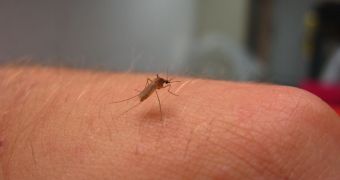One of the things that researchers noticed when analyzing a species of mosquitoes called Anopheles gambiae is that the insects appear to show a strong predilection towards biting humans. A team of experts is currently investigating ways of creating repellents that would drive the bugs away.
While the mosquito problem is more of a nuisance in the developed world, it represents a source of severe public health problems for the Third World. These insects carry various pathogens and diseases, including malaria. The latter is a deadly transmittable disease.
Malaria is extremely widespread around the world, infecting about 250 million people each year, and killing roughly 1 million of them. As such, finding a cure for it, or at least a way of preventing its spread, is an important international objective.
Researchers at the Vanderbilt University (VU) are currently using funds from the US National Science Foundation (NSF) to investigate how the most dangerous mosquitoes detect and track down humans.
The team decided to focus on Anopheles gambiae because this species has apparently taken a liking in biting humans. Females – the only ones that bite – exhibit a preference for human blood, and are very aggressive in obtaining it.
VU scientists have a number of specimens in a small, precisely controlled laboratory room. The insects are being constantly studied, and the group is already credited with having discovered a large number of smell receptors in these insects.
“These are Anopheles mosquitoes that still think that they're in Central Africa. We won't tell them any different,” VU professor of molecular biology and pharmacology Laurence Zwiebel explains.
“Anopheles gambiae often shows a strong preference for biting people. How do they do this? What makes them so predisposed to bite humans?” he asks. The expert and his team were able to determine that human smell is probably the most important factor dictating the mosquitoes' preferences.
Vector biologist Jason Pitts says that humans leave behind a large odor plume, which consists of a wide variety of chemicals. Human sweat is known to produce hundreds of different chemicals, any of which could be targeted by the mosquitoes' keen sense of smell.
“The number of compounds that have been identified in human sweat number in the hundreds. Things like carbon dioxide, ammonia, which is a byproduct of human sweat, and lactic acid, that we give off in sweat, other animals don't,” Pitts says.
Zwiebel says that future bug repellents based on this formula would literally bombard a mosquito's nose with such intense smells that it would put the insect off its guard, and scare it away.

 14 DAY TRIAL //
14 DAY TRIAL //